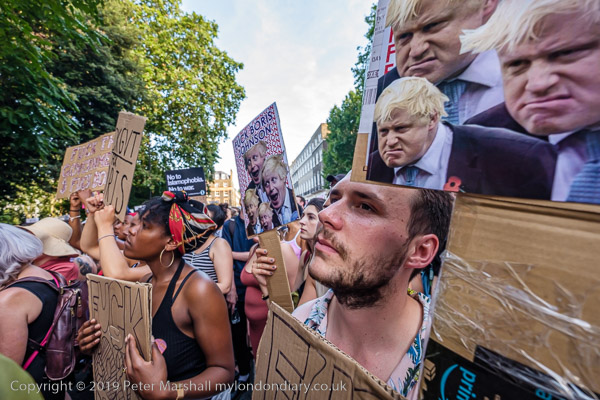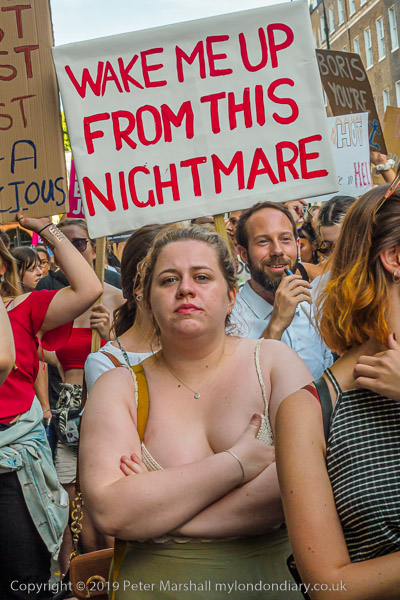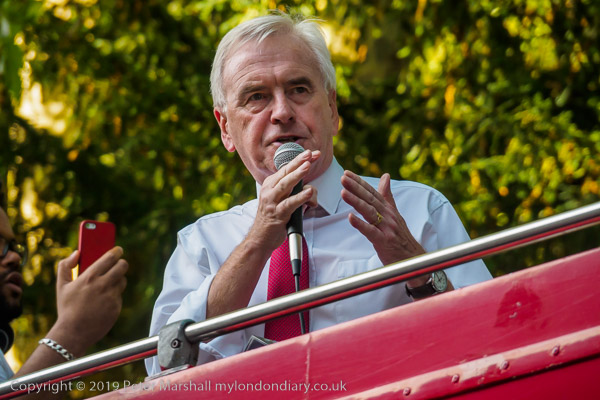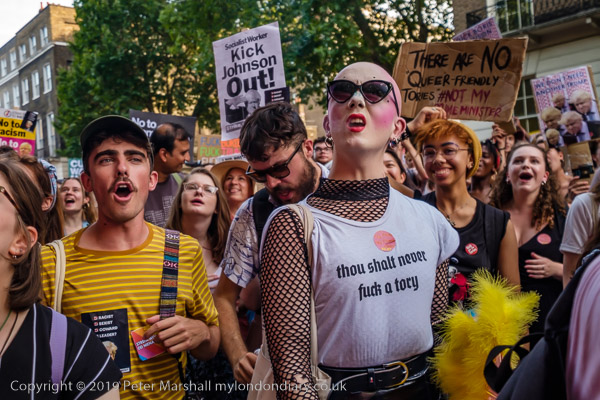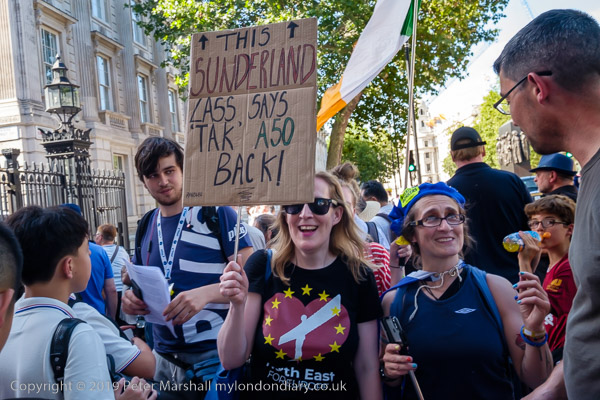Vaisakhi, Uganda & Freedom Umbrella: On Saturday 9th April 2011 After visiting Woolwich to photograph the Vaisakhi celebrations I came back into central London to photograph Ugandans and Kurds protesting for freedom and democracy.
Vaisakhi Celebrations in Woolwich
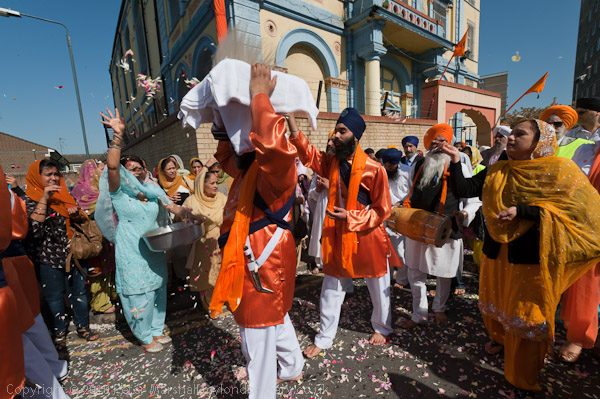
For some years I had been documenting religious festivals in and around London and had photographed a number of Sikh Gurdwaras at their Vaisakhi festivals.
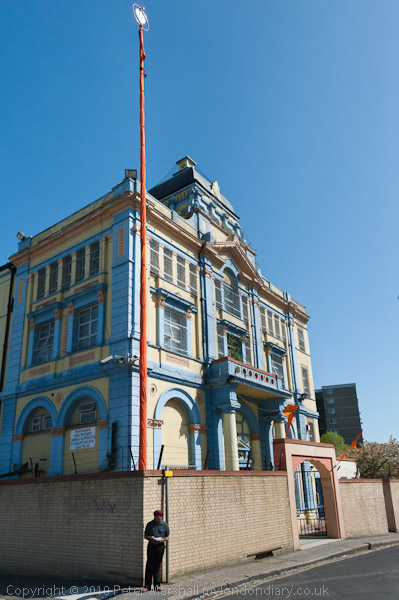
On Saturday 9th April 2011 I went to the Ramgarhia Association Gurdwara in Mason’s Hill Woolwich. The Ramgarhia are a Sikh community who originally came from the close to Amritsar in the Punjab and traditionally they were carpenters, blacksmiths and other artisan workers but were renowned for their military prowess and the victories of the armies.
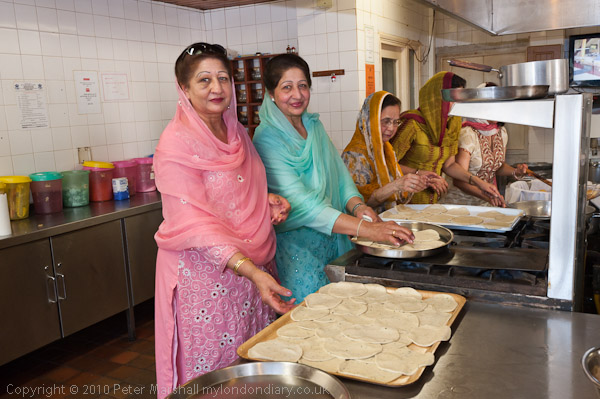
When I turned up I was warmly welcomed and taken to the Langar hall where I enjoyed some of the free vegetarian food on offer to all, prepared and served by members of the congregation who volunteer their services as a part of their religious practice and was able to talk with people there and wander around taking photographs.
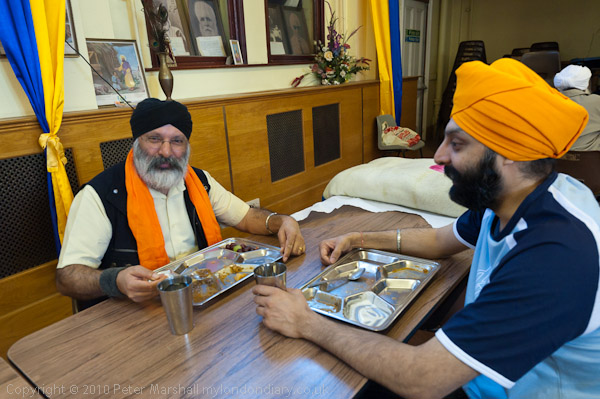
The Gurdwara was established in 1970 in an existing landmark building, the Victorian Freemasons Hall, just over the Woolwich border in Plumstead on a street which was then called Mount Pleasant.
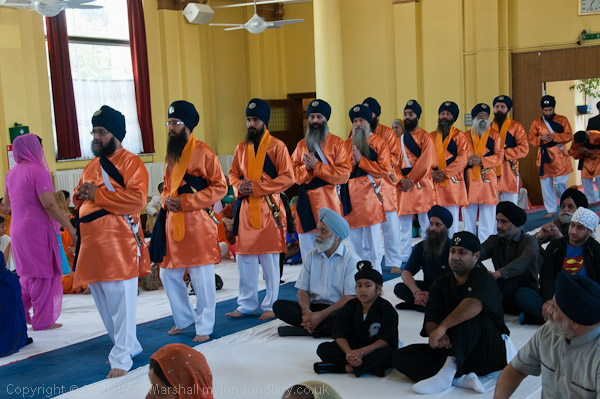
The Freemason’s Hall was where the Royal Arsenal Football Club held its annual meetings and dinners, and on 16th May 1891 that the Annual General Meeting of the Royal Arsenal Football Club (earlier known as Dial Square) the committee announced it had decided two weeks earlier to turn professional and had thus resigned from the amateur Kent and London Associations.
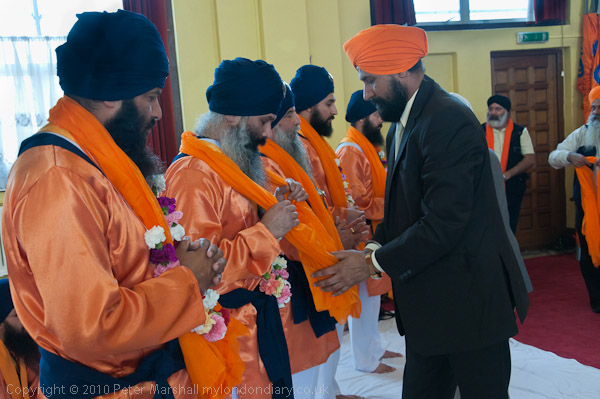
In 1913, the club moved across the river to a new stadium at Highbury, where it continued to play until 2006, when it moved the short distance to its new Emirates stadium. Apparently it is doing quite well at the moment.
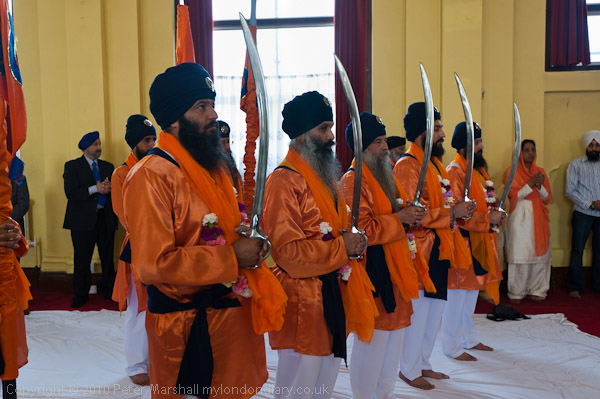
The Vaisakhi festival, which takes place on April 14 each year marks the formation of the Khalsa by Guru Gobind Singh, the tenth Sikh Guru, in 1699. You can read more about this and the Vaisakhi Nagar Kirtan procession which is lead by five Khalsa – baptised Sikhs – dressed in saffron robes and turbans and carrying swords in the account I wrote on My London Diary, Vaisakhi Celebrations in Woolwich, as well as in the posts on other Vaisakhi processions on that site.
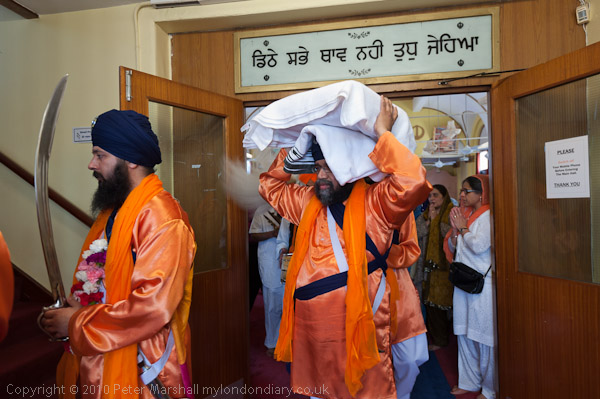
On My London Diary I wrote in more detail about the origins of Vaisakhi and the 10th Sikh Guru who gave Sikhism its modern form with its symbols and the eternal guru, the Guru Granth Sahib, the holy religious scripture being reverently carried out to the procession in th picture above.
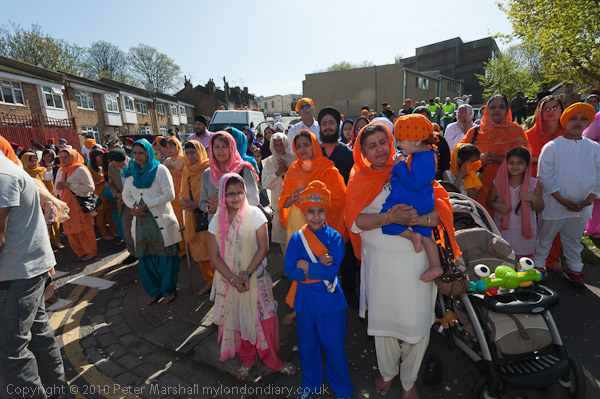
Unfortunately the start of the procession was delayed and although I had photographed the preparations for it I had to run to catch a train before the actual start of the colourful procession, with its joyful singing of Sikh hymns, martial arts demonstrations and Dhol drumming through the town, expected to take several hours.
More at Vaisakhi Celebrations in Woolwich.
Ugandans Demand Democracy – Uganda House, Trafalgar Square
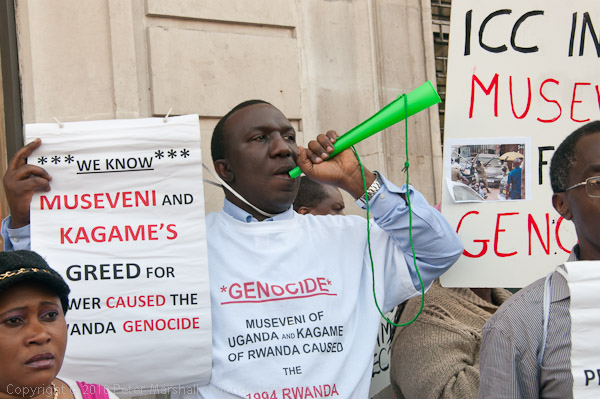
Ugandans had come to protest outside Uganda House in Trafalgar Square, calling for new free and fair elections after the rigged Parliamentary and Presidential elections in February.
The election on 18 Feb had resulted in the re-election of the sitting president Yoweri Museveni, in power for 25 years, apparently getting 68% of the vote.
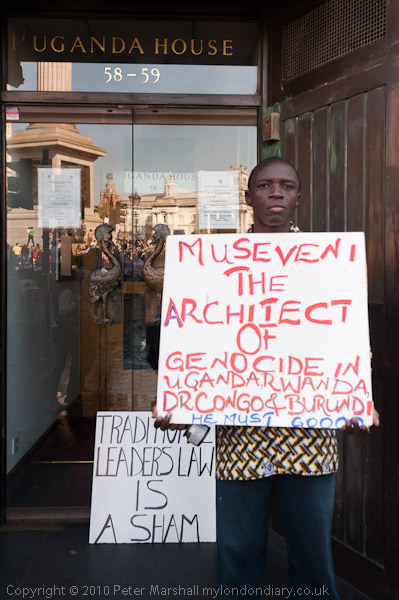
But the EU Election Observation Mission which had been in Uganda for the vote reported the election, with a turnout of only 59% had been “marred by avoidable administrative and logistical failures which led to an unacceptable number of Ugandan citizens being disenfranchised” and that Museveni had used his presidential power to “compromise severely the level playing filed between the competing candidates and political parties.”
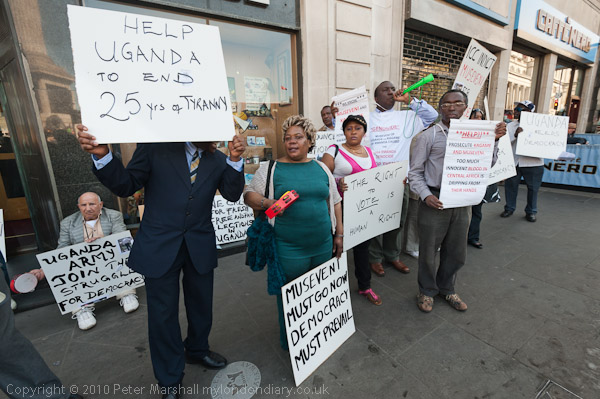
As well as the state owned Uganda Broadcasting Corporation giving much more coverage to the ruling NRM party, there had been extenisve human rights abuses with the police failing to take action against groups attacking opposition political meetings, intimidation and assaults on journalists and the cancellation of broadcasts.
Freedom Umbrella Kurds March Through London – Old Marylebone Rd – Downing St
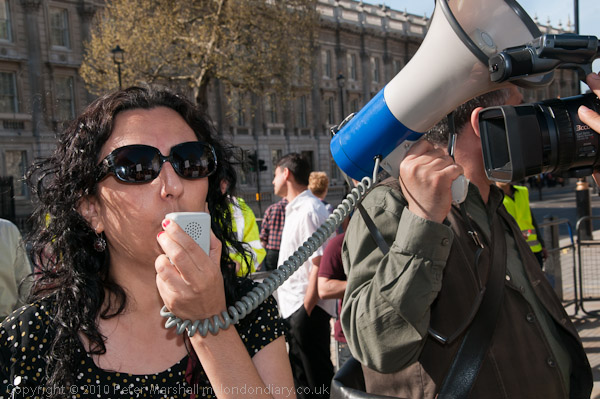
Freedom Umbrella (Chatri Azadi), a coalition of British-based Kurdish organisations and supporters, had organised a demonstration in front of the offices of the Kurdistan Regional Government in Old Marylebone Road followed by a march to a rally opposite Downing St.
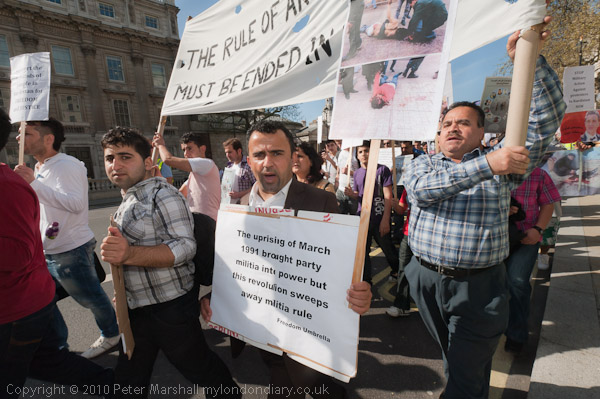
They called for support of the people’s uprising for freedom and social justice in the autonomous region of Iraqi Kurdistan which had begun on 17th February but had hardly been noticed by UK media.
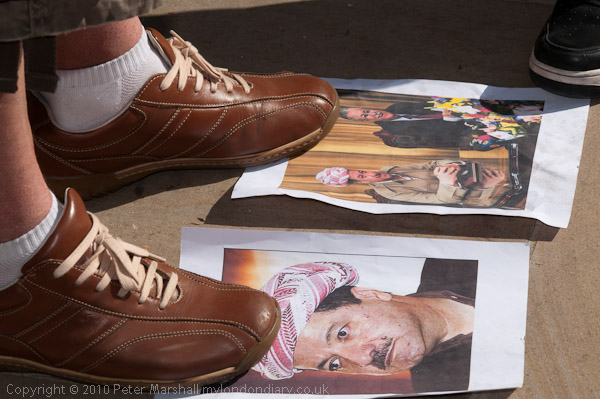
Two Kurdish militia groups dominate Iraqi Kurdistan and remain in power. On 19th April their security forces began a more organised violent crackdown on the protests which brought them to an end.
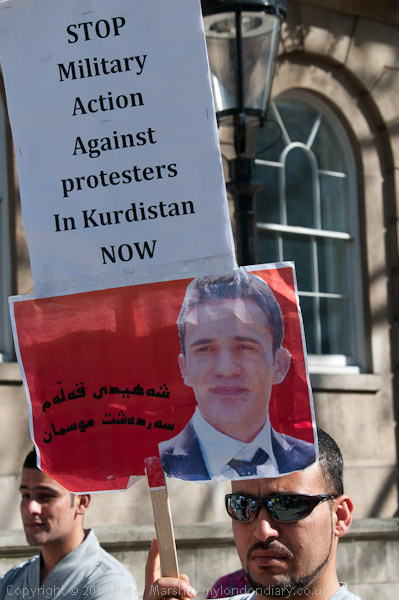
I met the protesters as the march neared Trafalgar Square and photographed their rally opposite Downing Street.
More pictures Freedom Umbrella Kurds March In London.
Flickr – Facebook – My London Diary – Hull Photos – Lea Valley – Paris
London’s Industrial Heritage – London Photos
All photographs on this page are copyright © Peter Marshall.
Contact me to buy prints or licence to reproduce.
